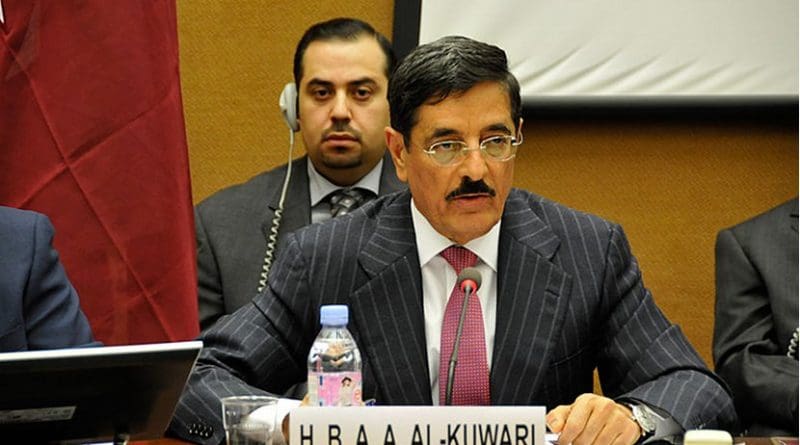Lessons Qatar Should Learn From Its UN Fiasco – OpEd
By Caroline Holmund*
For two years, Qatar had been lobbying hard for its candidate, Hamad bin Abdulaziz al-Kawari, to become the next director general of the UN Educational, Scientific and Cultural Organization – only to see him lose narrowly to France’s candidate, former culture minister Audrey Azoulay.
His recent defeat is excellent news for an organization that has lost not only much of its funding but also a great deal of its legitimacy in recent years, as member states have been exploiting UNESCO as a platform to hash out longstanding disputes, lay competing claims to sites of cultural significance, and call into question the global legitimacy of their rivals.
And had it not been for the enflamed rivalry between Qatar and a number of other Arab states, al-Kawari would not have lost. But because of the split in the Gulf Cooperation Council, the Arab world failed to rally behind a single candidate to lead UNESCO, despite their lamentations that no one from the Middle East or North Africa had yet had the chance to do so. Cairo, which had fielded its own candidate against Qatar’s, backed Saudi Arabia, Bahrain, and the UAE in their dispute with Doha, which they accuse of funding terrorist organizations and of growing too close with Iran.
But even faced with this defeat, Qatar has done precious little to cede to the demands of the Saudi-led coalition, which include ending ties with terrorist groups and curbing trade with Iran in line with US and global sanctions. The embargo of Qatar has now been dragging on for more than four months, raising questions of when, if ever, Doha will respond to the concerns of its former allies – concerns that are shared by much of the international community.
Much of the criticism revolves around Qatar’s support for the Muslim Brotherhood; its hosting of Taliban officials, al-Qaeda affiliates, and the political leader of Hamas; and its increasingly close ties with Tehran, a proxy funder of terrorism in its own right. Experts like the former US Treasury Under-Secretary for Terrorism David Cohen are also among those who have repeatedly charged that lackadaisical government oversight allows Qatari individuals to easily fundraise for extremist groups like Islamic State.
Rather than taking concrete steps to address these charges, Qatar has been putting far more energy – and cash – towards its global image enhancement campaign, which has included not only its bid to head UNESCO but also associated investment in what it sees as art and culture. Sheikha Al Mayassa, the sister of the ruling emir, has been a driving force behind Doha’s status as one of the world’s biggest art buyers, most recently overseeing the purchase of a Paul Gauguin masterpiece for $210 million – an artwork which has never been displayed for public viewing in the country. She is also the head of Qatar Museums Authority (QMA), which has underwritten ambitious building projects like the Museum of Islamic Art in Doha – one of the many projects that were built on the backs of some of the 2 million underpaid, overworked migrant laborers living in Qatar. Her family’s staggering wealth has allowed it to hire the services of celebrity architects like French star Jean Nouvel, who designed the recently opened $434 million National Museum of Qatar, as well as to sponsor exhibits by acclaimed European artists like Damien Hirst.
The royal family’s attempts to position itself as the world’s biggest patron of the arts mark quite the turnaround for a country that used to be a desert backwater – that is, until natural gas reserves were discovered in the 1970s and Qatar soon found itself flush with cash. For many outside observers, their interest in the arts is incongruous for a country that has little to no culture of its own. But there are several underlying reasons why the royal family has been investing so much of its natural gas revenues into this sector.
In fact, what’s propelling these investments into such “soft” sectors has been the government’s desire to boost Qatar’s international reputation, particularly ahead of the 2022 World Cup – ironic given the fact that the bidding process was tarnished by allegations of bribery and abuse of the migrants workers building stadiums for the tournament. The government also undoubtedly hopes that by building up an image as a patron of the arts, it can help mitigate the persistent claims that Doha is a proxy funder of terrorism. Additionally, Qatar’s extravagant international investments in not only the European art world, but also sports, luxury, and real estate – from French football teams to iconic European fashion brands to landmark London properties – have another ulterior motive. That is, to buy local influence rather than taking the more meaningful route of aligning with the norms and values shared by Europe and most of the international community.
Nevertheless, the billions that Qatar has invested in art over the years were still not enough to convince fellow UNESCO member states that it was ready to lead the UN’s leading cultural organization – let alone enough to wash away the stench of charges that it is far too cozy with extremist groups and regimes. This is because Qatar is still ignoring the simple fact that when it comes to improving its international reputation, it is not appearances that matter so much as facts. Its loss of UNESCO’s leadership was a stark reminder of this.
For now, therefore, UNESCO has been spared a director general who would likely have used his seat mainly to further burnish Qatar’s artistic and cultural credentials and score points against other Arab nations, rather than promoting the agency’s mission of fostering global dialogue, education, and peace. Now, it is up to Audrey Azoulay to do what she can to save what is left of the organization’s legitimacy.

